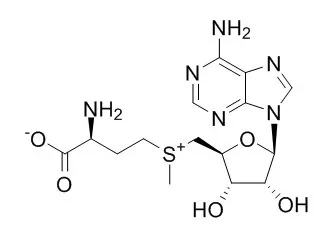| In vivo: |
| Toxicol Appl Pharmacol. 1989 Feb;97(2):216-29. | | Inhibition by ethanol of rat liver plasma membrane (Na+,K+)ATPase: protective effect of S-adenosyl-L-methionine, L-methionine, and N-acetylcysteine.[Pubmed: 2538005] |
METHODS AND RESULTS:
S-adenosyl-L-methionine(S-Adenosyl-L-Methtonine,SAM), L-methionine, and N-acetylcysteine (NAC), given to rats during ethanol treatment, prevented the decrease in (Na+,K+)ATPase activity and GSH content. They also reduced steatosis and liver necrosis. The efficiency of these compounds decreased in this order: SAM, methionine, NAC. SAM accelerated the recovery of all parameters studied after ethanol withdrawal, and also protected (Na+,K+)ATPase activity and GSH content of isolated hepatocytes from the deleterious effect of ethanol. These SAM effects were prevented by 1-chloro-2,4-dinitro-benzene, a compound which depletes cell GSH. Treatment of isolated hepatocytes with [35S]SAM led to the synthesis of labeled GSH. The total amount and specific activity of labeled GSH underwent a significant increase, in the presence of 2 mM ethanol or 0.5 mM ACA, which indicates a marked stimulation of GSH synthesis by ethanol and ACA.
CONCLUSIONS:
These data indicate that ethanol intoxication may inhibit (Na+,K+)ATPase activity; an effect that does not seem to depend on cell necrosis. SAM, methionine, and NAC exert various degrees of protection toward ethanol-induced cell injury, which are related to the efficiency of these compounds in maintaining a high GSH pool. |
|






 Cell. 2018 Jan 11;172(1-2):249-261.e12. doi: 10.1016/j.cell.2017.12.019.IF=36.216(2019)
Cell. 2018 Jan 11;172(1-2):249-261.e12. doi: 10.1016/j.cell.2017.12.019.IF=36.216(2019) Cell Metab. 2020 Mar 3;31(3):534-548.e5. doi: 10.1016/j.cmet.2020.01.002.IF=22.415(2019)
Cell Metab. 2020 Mar 3;31(3):534-548.e5. doi: 10.1016/j.cmet.2020.01.002.IF=22.415(2019) Mol Cell. 2017 Nov 16;68(4):673-685.e6. doi: 10.1016/j.molcel.2017.10.022.IF=14.548(2019)
Mol Cell. 2017 Nov 16;68(4):673-685.e6. doi: 10.1016/j.molcel.2017.10.022.IF=14.548(2019)